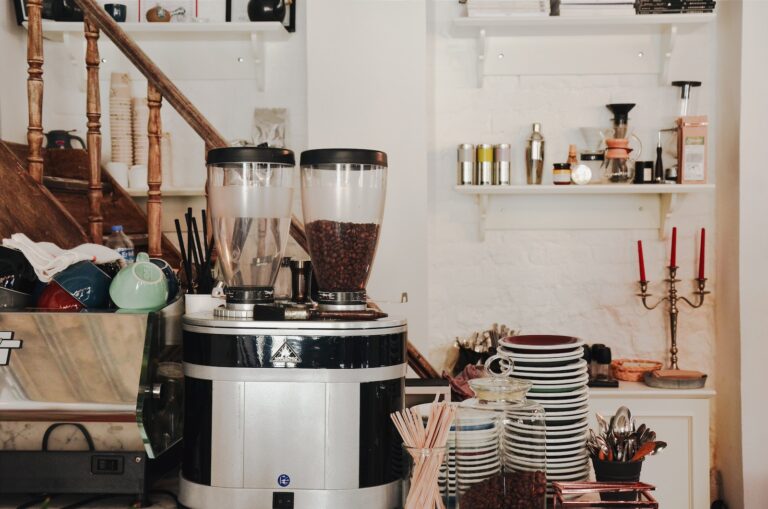Are you a coffee aficionado looking to up your home brewing game? If so, you may have already discovered that there’s a vast difference between the quality of coffee produced by commercial grinders and those designed for home use.
In this blog post, we’ll explore why commercial grinders are different from home grinders and how investing in one can take your morning brew from good to exceptional. So grab a cup of Joe and settle in – it’s time to become an expert on all things grinding!
What is a Commercial Grinder?
Commercial grinders are specifically designed for grinding purposes. These grinders have a significantly higher power density than home grinders and are often equipped with more robust motors. This allows them to handle a wider variety of materials with greater precision.
Commercial grinders are also typically more expensive than home grinders, but they offer many advantages that make them ideal for businesses and large-scale production. Some of the main advantages of using a commercial grinder are accuracy, speed, and consistency.
Commercial grinders are typically very accurate, meaning that they can produce finely ground material with little to no grain size variance. This is important for products such as pharmaceuticals and food products where exacting quality is mandatory.
Additionally, commercial grinders are extremely fast – often able to grind materials at speeds in excess of 300 degrees per minute – which contributes to their high productivity levels. Finally, commercial grinders tend to be very consistent – meaning that the output from the grinder will be similar each time it is used.
This is essential for producing consistently sized products or seeds that have the same shape and dimensions throughout. While commercial grinders offer many advantages over home grinders, there are some limitations too.
First and foremost, commercial grinder motors are typically much more powerful than those found in home grinders, which means that they require a bit more care when handling them. Additionally, while commercial grinders can handle a wider range of material types than home machines, they may not be optimized for certain types of materials. For example, if you are looking to grind grain for malt production, a commercial grinder may not be the best choice due to its lower power density.
Types of Commercial Grinders
Commercial grinders are specifically designed for grinding coffee and other dry grains. Many home grinder owners also choose to use a commercial grinder for convenience, as commercial grinders produce finer grinds than most home grinders.
Commercial grinders can be mechanical or electric and can come in a variety of sizes. Electric commercial grinders are often more versatile and easier to use, while manual commercial grinders typically offer more control over the final product.
Some common types of commercial grinders include:
Mechanical Commercial Grinders: Manual grinders are typically less expensive than electric commercial grinders, but they may not be as versatile or as efficient. They typically use flat stone wheels to create a fine ground product.
Electric Commercial Grinders: Electric commercial grinders are less expensive than manual commercial grinders, but they often offer more versatility and efficiency. They use cylindrical burrs to create a fine ground product.
Home Commercial Grinders: Home commercial grinders typically offer a higher quality product than small home grinders, but they may be more expensive. They use conical burrs to create a fine ground product.
What are the Differences Between a Home and Commercial Grinder?
Commercial grinders are typically more powerful and have more features than home grinders. Commercial grinders can handle larger quantities of coffee, pod and powder forms, making them better suited for large-scale production.
They also typically have larger hoppers that can hold more material, making them faster machines. Additionally, commercial grinders often come with additional features such as automatic cleaning and descaling capabilities.
Home grinders tend to be less powerful and may only have basic features such as a timer or ability to hold large quantities of material. They are often cheaper than commercial grinders and may not come with additional features or storage capacity.
Why You Would Use a Commercial Grinder?
Commercial grinders are different from home grinders in a few key ways. First, commercial grinders are typically much larger, making them more efficient when processing large quantities of food. Second, commercial grinders often have more power than home grinders, making them better suited for tasks like grinding meat or coffee beans.
Finally, commercial grinders typically come with more features and conveniences than home grinders, such as additional plates that can be used to process different types of food, or features that allow you to easily adjust the Grind setting. If you’re looking for a high-quality grinder that’s versatile enough for all your food processing needs, a commercial grinder is an excellent option.
Thanks to their larger size and greater power, commercial grinders are better suited for tasks like grinding meat or coffee beans. Additionally, many commercial grinders come with additional features and conveniences that make them easier to use than standard home grinders—like additional plates that can be used to process different types of food or features that allow you to easily adjust the Grind setting. So if you’re looking for a reliable grinder that can handle a variety of tasks quickly and easily, a commercial model is definitely the way to go.
Importance of choosing the right grinder
There are a few things to consider when choosing a grinder for your home kitchen. The most important factor is the type of ground coffee you plan to use it for. Commercial grinders typically have larger slots that can handle wider dosages of coffee, while home grinders are more likely to have smaller slots that produce finer grounds.
Another important consideration is the size and capacity of the grinder. Some models can hold up to 12 cups of coffee, while others can only handle 2 or 3 cups at a time. Additionally, some commercial grinders come with built-in scales that weigh the beans before grinding them, adding an extra step to the process.
Home grinders don’t usually come with this feature, but there are models that allow you to add beans directly into the grinder without weighing them first. Finally, be sure to check out the features and specifications of each model before making your purchase. There are many different types and styles of commercial grinders available on the market, so it’s important to find one that fits your needs specifically.
How to Choose the Right Commercial Grinder for Your Needs
Commercial grinders are specifically designed to handle large batches of coffee, ensuring that the product is evenly ground and of consistent quality. This allows for a better-tasting cup of coffee, as well as reduced waste and cost.
There are a few factors to consider when choosing a commercial grinder: the size of the batch being processed, the number of cups per batch that need to be ground, and the speed of the grinder. Size is an important factor to consider when choosing a commercial grinder.
The machines typically have bigger hoppers than home grinders, which allow for larger batches to be processed at one time. Larger batches mean that more coffee is being ground at one time, which in turn means a lower quality product due to uneven grinding.
Number of cups per batch is also an important factor to consider when choosing a commercial grinder. Most machines can process up to 12 cups per batch. Some models can even process up to 24 cups per batch. If you plan on processing large batches of coffee regularly, then purchasing a commercial grinder is likely the best option for you.
Speed is also an important factor to consider when choosing a commercial grinder. Commercial grinders typically operate at faster speeds than home grinders, which ensures that more coffee is being ground at once and results in higher quality products.
Conclusion
Commercial grinders are built to do a specific job – grinding coffee. Home grinders can be used for a variety of tasks, but they typically don’t have the capacity or features needed to make high-quality ground coffee.
That said, there are some home grinders on the market that can tackle this task, and we’ve explored one in particular. Ultimately, it comes down to what you’re after when it comes to your grinder – is it for making coffee only? Or do you want more versatility? Whichever scenario applies to you, review our top picks for commercial and home grinders below so that you can find the perfect option for your needs.



One Comment